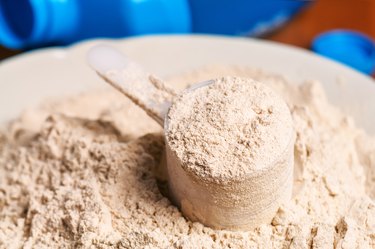
Protein powder is beloved by bodybuilders, who often cannot take in enough protein through food alone to meet their bodies' muscle-building needs. The powder can also be a great help to pregnant people, teenagers enduring a growth spurt and people recovering from injury or surgery. The key to using protein powder effectively is to read the label for hidden sugars and other additives.
Tip
Protein powder is not harmful to your liver or kidneys, as long as they are free of damage or disease.
Video of the Day
Protein Powder and Kidneys
The main function of your kidneys is to act like a water filtration system. When you digest protein, it creates nitrogen byproducts that are flushed from your bloodstream through urination. This is where the myth that protein shakes damage kidneys comes in. The reasoning is that if you overload your kidneys with protein, they will not be able to handle the excess. This, according to the International Sports Sciences Association, is not true if you have healthy kidneys. They will simply work harder to process the extra protein.
Video of the Day
But while taking in too much protein can put a strain on damaged or diseased kidneys, according to Fredric Coe, MD, at the University of Chicago, there is no clear link between a high protein diet and kidney stones. As long as your kidneys are healthy, protein can be a convenient and effective addition to your diet.
Protein Powder and Your Liver
Your liver is responsible for cleaning the toxins from your bloodstream. Complete proteins support healthy liver function and also repair damaged tissue. Your body neither produces the nine most important amino acids needed to make a complete protein, nor stores protein — which is why a healthy, balanced diet is so important.
Certain conditions, such as cirrhosis, make it more difficult for your liver to function. A high protein diet can help your liver regenerate, according to the experts at LiverSupport.com, but if you have cirrhosis, a diet too high in protein can cause the levels of ammonia in your body to soar. If you have cirrhosis or any other serious liver disease, check with your health-care provider to figure out how much protein you should be taking in every day and whether you can accomplish that through careful meal planning or if you need to take protein supplements such as a powder.
Best Type of Protein Powder
The best place to get your protein is from your diet, by eating foods such as eggs, lean meats, low fat dairy, nuts and beans, according to the Wexner Medical Center at Ohio State University — but protein powders are an effective supplement. Whey protein is left over during the making of cheese. It contains all nine amino acids, which are necessary to support liver and kidney function, repair damaged tissue, aid in fat burning and provide energy. Whey protein side effects can include an upset stomach, and allergic reactions in people sensitive to dairy; it also may interfere with the effects of antibiotics as well as medications for parasites and osteoporosis, according to the Mayo Clinic. If you experience any of these issues, there are protein powders available based on soy, rice and peas instead of whey. You might also want to try high protein pills, but always consult your health-care provider before starting any supplement if you have a damaged or diseased liver or kidneys.
- The University of Chicago: Does Too Much Protein Increase Stones or Damage Bones?
- International Sports Sciences Association: How Much Protein Do I Need: Protein Myths Busted
- University of Ohio - Wexner Medical Center: Is Protein Powder Good For You?
- LiverSupport.com: The Advantages of Consuming Protein for Liver Health
- Mayo Clinic: Whey Protein